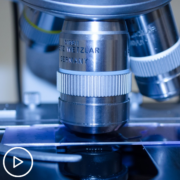Lab Tests in Myeloma: Key Results to Monitor
Lab Tests in Myeloma: Key Results to Monitor from Patient Empowerment Network on Vimeo.
Nurse practitioner, Beth Faiman, discusses laboratory tests for multiple myeloma, including which results should be monitored closely and how different labs may vary.
Beth Faiman is a nurse practitioner in the department of hematologic oncology at Cleveland Clinic. More about this expert here.
See More From The Pro-Active Myeloma Patient Toolkit
Related Resources

|
Transcript:
Beth Faiman:
Laboratory results can be quite anxiety-provoking for some patients and others are pretty easygoing about it. One of the most important things I share with patients whether they come to see me every month, every three months, or sometimes we share care with referral providers is always take ownership of your own care.
You are your best advocate and it’s important to find out what kind of myeloma you have and what they myeloma specialist thinks is important in monitoring your labs. So, for example, there are kappa and lambda light chains, and everybody has a different form of myeloma. Find out the best way that they can monitor their myeloma. Also, key lab results like blood creatinine level, reflect kidney function, hemoglobin carries oxygen and that’s your anemia number. So, finding out those important key lab values and keeping track of them over time can help feel — patients feel empowered often times in their care.
But with that, I always have the caveat, take the results with a grain of salt because there are lab variations within one’s own institution or when you’re going outside of institutions if we partner with care. So, that can be about 20/25 percent lab error each month depending on the test result.
Lab values can fluctuate quite rapidly. So, if I draw a serum creatinine level in the morning, and it might be high indicating kidneys might not be functioning normally, I can encourage them to have some hydration or — and then recheck that lab value and it might go down. The same with the serum-free light chains and M-Spikes.
The lab variation within a single day can be very, very, very diverse. So, it’s important to say, hey gosh, it’s abnormal one day or one hour of the day, but then the next time it can be normal. Or normal for you a well, because there are normal values for one patient that’s abnormal for the other, and vice-versa.












